|
Drama on television has been around as long as the medium has, in fact for longer: in 1930 John Logie Baird made for a test transmission of his television system – just thirty lines – a production of Luigi Pirandello’s one-act play The Man with a Flower in His Mouth. Soon after the BBC began its regular television service in 1936, it included drama among its output. The very first example was just four days after the channel launch, on 6 November 1936, a compilation of scenes from the then-current West End Play Marigold. Even when original drama was written and produced, there was more than a sense that television plays had more than one foot in the theatre rather than being a form in their own right. And, like stage plays, it was a medium that was experienced just the once, broadcast live with no way of recording them. A “repeat” showing meant reassembling the cast and crew and performing the whole thing over again. Television drama producers (in the stage sense: that is, directors) did try to expand the vocabulary of their medium, with some outside-broadcast or prefilmed exterior work being used in plays even before the television service was shut down for the duration of World War II, there was still the sense that TV drama was struggling to define itself as something more than broadcast theatre or radio with pictures. Of course, what bedevils any investigation of early TV drama is the fact that great swathes of it no longer exist.
A second channel, ITV, which arrived in 1955, included drama among its output from the start. One popular series was Armchair Theatre, which broadcast a new written-for-TV play each week. This was run by Sydney Newman from 1958 to 1962, after which the BBC headhunted him to become its Head of Drama. As an outsider – a Canadian – Newman was not afraid to shake up orthodoxies, and he encouraged new writers and directors and drama which was not afraid to be provocative, to stimulate as well as to entertain. One of the results of this approach was The Wednesday Play, which began in October 1964 and ran for six years, including such classics as Cathy Come Home (1966, one of ten Wednesday Plays directed by Ken Loach). In 1970, The Wednesday Play became Play for Today, in part so as not to fix it to a particular day of the week, though it mostly settled on Tuesday at 9.25pm on BBC1, after the News. Again the emphasis was both on new writers and new work from established names, though in its early days the series included some repeats from The Wednesday Play and elsewhere. While the great majority of plays were original to TV, there were also some adaptations from stage or from novels. Play for Today provided a home for such directors as Loach, Stephen Frears, Alan Clarke and Mike Leigh, who were unable to make cinema films for much of the 1970s.
Over fourteen years, over three hundred Plays for Today were broadcast. Thirty video-shot plays no longer exist, having been wiped. Another six exist as black and white 16mm telerecordings, two more surviving as early home video recordings and one more as audio. Despite those sad losses, the legacy of Play for Today is a rich one. While many associate Play for Today with issues-led drama, usually with a leftish political leaning, its range of styles and genres was wide: comedies as well as tragedies with all shades in between, visually experimental pieces beside verité-style naturalism, and despite that “Today”, historical/period pieces and excursions into science fiction. Other than what it said in the Radio Times and that day’s newspaper, you didn’t know what you were in for when you sat down to watch a Play for Today and, with just three channels at the time, the best examples provoked much discussion the next day. Water-cooler television before there were water coolers.
Of course, much of Play for Today reflects the times when they were made, and that includes the content. Minority characters often only appeared as problems to be, if not solved, then considered and worried over, rather than people in their own right. Though, in such dramas’ defence, depictions of these minorities in mainstream television elsewhere was noticeable largely by its absence. This was reflected in the make-up of the writers and directors who worked on the seriess: just three writers of colour (and the play in this set dealing with non-white characters was written by a white writer) and one non-white director, namely Trinidad-born Horace Ové. Relatively few women wrote for the series and just twelve plays had female directors, five of those twelve being Moira Armstrong. While, in its post-watershed slot, Play for Today pushed at the limits of acceptability, one taboo area was language: while writers sometimes included the kind of racial slur that they would approach with caution nowadays (there’s one, quite out of the blue, in Stocker’s Copper, for example), what would now be referred to as strong or very strong language was not allowed at all in scripted drama. On the BBC, such language was forbidden until a 1980 dramatisation of the 1960 Lady Chatterley’s Lover trial, with the justification there being that it was a dramatisation of a true event and the language concerned was on the historical record. (Or so the history says. However, that may not actually have been the case, of which more in a while.)
The BFI’s first Play for Today Blu-ray box set, released in November 2020 as part of the series’s fiftieth anniversary celebrations, comprised seven plays over four discs. This second volume has six plays on three discs, though one of those six plays is a double bill. Unlike as in the first set, the plays here are not presented in chronological order.
Stocker’s Copper, first broadcast on 20 January 1972, shows that Play for Today sometimes belied its last word, drawing on history as much as the here and now to comment on the present. In this case, those historical events were a real-life strike by china clay (kaolin) miners in Cornwall in 1913, and so within the memories of some of the audience when the play first went out. Tom Clarke was not one of them, having been born in 1918, but as a Cornish resident he was aware of the events, from accounts by those who were there, if young at the time.
We don’t begin with the miners, but with a detachment of policemen from Glamorgan sent to keep order during the strike. Sitting side by side, in two rows facing each other, on the train sending them through the Cornish countryside they are still and silent, but that’s broken by Herbert Griffith (Gareth Thomas) and his wonder at the sight of what he takes to be snow but is actually a huge heap of kaolin. The policemen are billeted with locals, in Herbert’s case striking miner Manuel Stocker (Bryan Marshall), his wife Alice (Jane Lapotaire) and his young son and daughter. At first Manuel is opposed to Herbert living under his own roof, despite the money the billeting brings in. But soon a friendship develops between the two men. One also develops between Herbert and Alice.
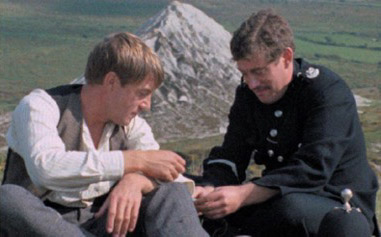
As the play progresses, we learn more about Herbert, who has had experience of breaking up strikes elsewhere, and has had the stitches in his head to prove it. While Manuel has been active in persuading the men of the village to join the strike, and has taken his turn in reacting against blacklegs, he isn’t at all confident that this strike will succeed. Herbert, himself a former steel worker, thinks that Manuel would make a good policeman. While they may be on opposing sides, the two men have much more in common than at first appears. But that opposition ultimately cannot be ignored. The story ends in violence and (spoiler, though these are events of historical record) defeat, but as Herbert says, breaking the fourth wall, it’s not personal.
Stocker’s Copper, shot entirely on location and on film, could easily have been a simplistic us-against-them narrative. The fact that it doesn’t is a tribute to Clarke’s writing and Jack Gold’s direction, aided by fine performances by Marshall (ubiquitous in Seventies television, before he emigrated to Australia) and Thomas (playing his own nationality for once, and now of course best known as Blake in Blake’s Seven), and to some extent, Lapotaire, who has less to do. While it was a period piece at the time, and is now a historical one, it spoke to a nation with its own share of industrial unrest. Nearly fifty years on, it still does. Stocker’s Copper won the BAFTA Award for Best Single Play, against some strong competition, beating The Resistable Rise of Arturo Ui (also directed by Gold) and the Alan Clarke-helmed To Encourage the Others.
Tom Clarke wrote two Plays for Today, and it’s a measure of his versatility that the second one was Victims of Apartheid, the second play of the ninth series, broadcast on 24 October 1978. While Stocker’s Copper was a period/historical piece, Victims of Apartheid was up to the moment. Black South African George (John Kani) now lives in London, but he bears the scars (mental if not physical) of his treatment he received in his native country. He is a member of Christian Underground, an anti-apartheid organisation run by Canon Capper (Peter Jeffrey). George is surrounded by friends, white as well as of colour, but he comes to wonder if, despite the freedom he has in England, if the situation is indeed all that different. Yes, there is no colour bar here, and therefore no racial segregation, but racism there certainly is. There’s a sense of us against them, the them being other, such as those “fresh off the boat” as opposed to those who have been here for most if not all of their lives. As a bus conductor says in conversation with George, if you have racialism, who needs a colour bar?
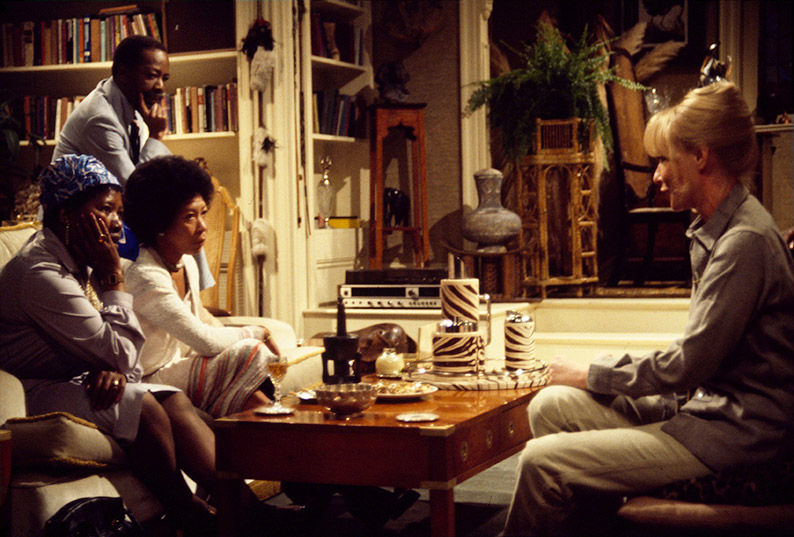
As with Stocker’s Copper, there’s a fair amount of humour in Victims of Apartheid, but the underlying seriousness of the play is not in doubt. And from time to time, the laughter stops: not least in George’s verbal descriptions of and flashbacks to his torture at the hands of the South African authorities. These are not necessarily graphically shown, and distanced a little further by means of solarised video camerawork, but are enough to give any audience pause.
I mention above that writers and directors of colour working for Play for Today were notably few, which to some extent reflected the British television industry at the time, not that that should excuse it. With that, Victims of Apartheid is a little uneasy now, given that the writer and the director (Stuart Burge) were white men. So while they certainly did a commendable job with this play, and I’m not going to suggest that people should only write and direct according to their own experience (or the experience of their race and/or gender), you have to wonder what a different writer and director would have made of this. There’s no doubt of the credentials of the cast, however, not least John Kani, himself born in South Africa and a noted stage actor, often in collaboration with Winston Ntshona interpreting the plays of Athol Fugard such as Sizwe Bansi is Dead.
Disc Two begins with The Spongers, one of the series’s landmarks. It was broadcast on 24 January 1978. Play for Today at the time was going through a purple patch: two months earlier had seen the first broadcast of Mike Leigh’s Abigail’s Party (it was the repeat showing in 1979, with ITV dark due to a strike, which attracted an audience of sixteen million, cementing the play in the public consciousness where it remains). Two weeks before The Spongers was David Hare’s Licking Hitler, a period piece (World War II), and then there was the borderline-SF, switching between the present and two historical times, Red Shift, by Alan Garner from his novel. So, what was it to be this week? Something absolutely and urgently up to date, that for most of those watching it hit home and hit hard.
Play for Today was always a flexible slot. While the plays started at the same time on the same day each week, they were as long or as short as they needed to be. That said, the plays were almost all feature length, if you take the lower limit of “feature” down to fifty minutes. Some were shorter even than that, of which more below. However, the majority came in within 100 minutes, enabling viewers to switch off and retire to bed just after 11pm. But some were longer than that, and The Spongers, written by Jim Allen, was one. (Allen tended towards the expansive, and his United Kingdom (1981) holds the record for Play for Today at two and a half hours.)
The Spongers is set amongst the celebrations for Queen Elizabeth II’s Silver Jubilee in 1977. “Sponger” is a derogatory term for a benefit claimant, implying that they are living off the state and not putting in the effort of actual work, either finding it or doing it. Allen and director Roland Joffé are hardly subtle in having the title come up over the images of the Queen and the Duke of Edinburgh. Who are the real spongers? Allen points out that the supposed huge number of people demonised by the media for being on the dole is outweighed by the greater number of people too proud to apply for benefits they are entitled to. Allen is not afraid to name the names of the media doing that demonising, and no doubt guaranteed himself bad reviews in the Daily Mail and Daily Express by doing that.
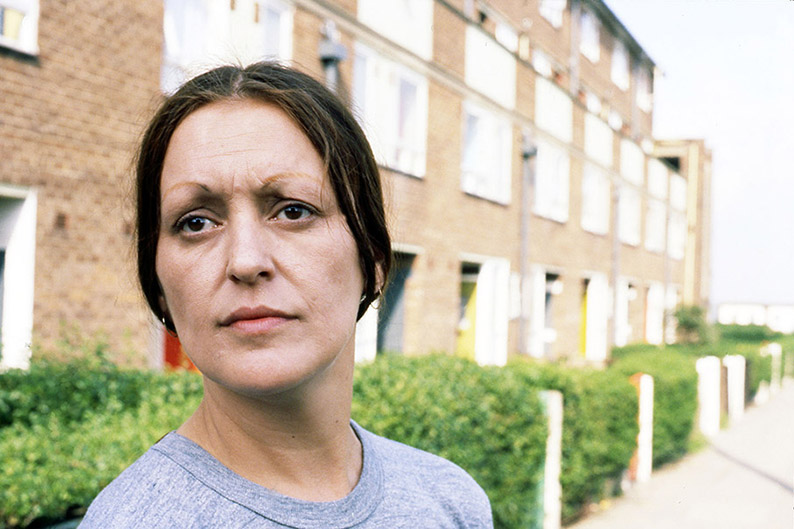
While there are several other strands throughout this play, it centres on Pauline (Christine Hargreaves), a single mother with four children. One of them, Paula (Paula McDonagh), has Down’s Syndrome – not specified in the script (nor is the discriminatory term beginning with M used either) but clear enough. Her rent arrears have led to a visit from the bailiffs and she has fifteen days to sort things out. Meanwhile, Paula is moved from a care home and more or less dumped into an old people’s home.
It would be easy for Allen and Joffé to paint the Department of Health and Social Security officers in this story as unfeeling monsters, but The Spongers is more subtle than that: they’re not unsympathetic but are people doing an increasingly impossible job in the face of demands for local government cuts, and are trained by the system to be unforgiving. It’s certainly clear where the play’s sympathies lie. The centrepiece of the play, at its halfway point, is a meeting with the DHSS which almost all plays out on the faces of Pauline and her father Peter (Peter Kerrigan), there to help her in her appeal for exceptional needs payments. The play is not unremittingly downbeat, as humour thrives in the face of adversity, and Pauline has a network of female friends and relatives who have her back. Pauline’s aunt Gertie (Gertie Almond) has a sideline as a stand-up comedian, with some jokes about as blue as would have been allowed in 1970s television drama. But the ending is a gut punch, the more devastating for the low-key way it is set up. It carries on into literal darkness as lights are turned out at night, and then the soundtrack cuts to silence.
The play originated with Allen and producer Tony Garnett’s investigations into the withdrawal of children with mental handicaps from a care home, which formed the basis of Paula’s story. Roland Joffé had directed for the stage and episodic television before this, and Garnett hired him despite the BBC’s clearance procedure deeming him a security risk due to his left-wing views.
The Spongers surprisingly was not nominated for the BAFTA Award, though it did win the Prix Italia for Best Drama. Jimmy McGovern rates it as “the best television programme ever made” and you can see its influence, and Allen’s in general, in his work. It has dated only superficially, and remains one of the major works in the whole Play for Today series.
Given the series’ flexible timeslot, Plays for Today could run shorter as well as longer, and while almost all were of feature length, they sometimes pushed at the lower limit of the definition of “feature”. At forty-eight minutes, The Elephants’ Graveyard (first broadcast on 12 October 1976) is only three above the dividing line that the Internet Movie Database uses. (The shortest standalone Play for Today was N.F. Simpson’s forty-minuter Thank You Very Much (1971) but Campion’s Interview was even shorter – see below.)
Peter McDougall, born in 1947 in Greenock, where both of his plays in this set take place, left school at fourteen to work in the shipyards. He relocated to London was was working as a house painter when he met Colin Welland. Welland was a significant figure in Play for Today, either as a writer or an actor or both, and here as a mentor. Listening to McDougall’s stories, Welland encouraged him to write about them. McDougall’s first produced work was a Play for Today, Just Your Luck (1972). This was followed by Just Another Saturday (1975), which teamed him with Edinburgh-born director John Mackenzie, who was on board for McDougall’s remaining two Plays for Today, both included here.
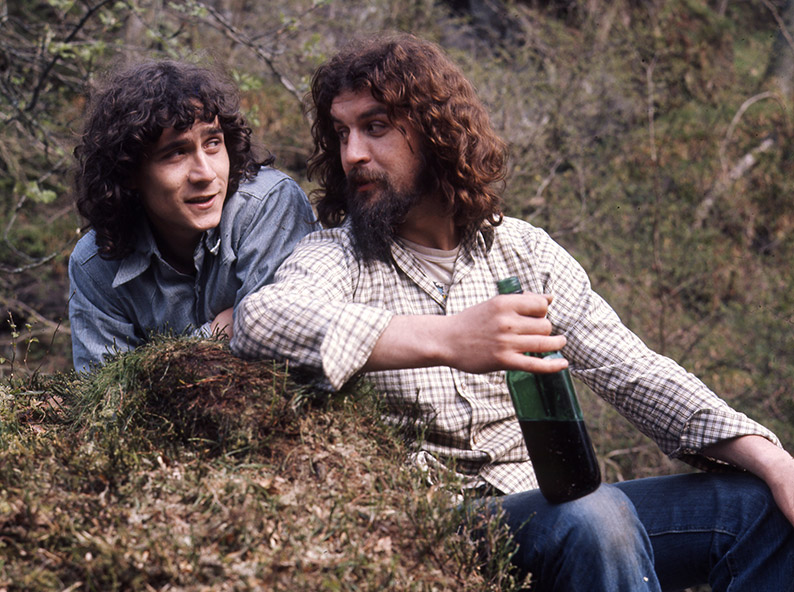
The Elephants’ Graveyard is a piece in a minor key, with a cast of just two. It begins with Bunny (Jon Morrison) walking away from the town up a hill. He’s told his wife he’s at work, but he isn’t. He may not even have a job that he’s taking time off from. He soon meets Jody (Billy Connolly), an older man, also seemingly taking leave from his wife. Both of McDougall’s plays here are character-led, with much of the action being that of the interaction between the people he depicts, often but not always men, and the flavoursome dialogue he gives them. In fact, an examination of masculinity is at the heart of both plays (see the title of the other one, for starters) and for forty or so minutes we see Jody and Bunny bond, commiserate, express their feelings if not always successfully, and compete like a younger and older stag locking horns. As they part at the end, on the surface little has changed, but inside quite a lot has. There’s also a hint that Jody may not actually exist and is a figment of Bunny’s imagination.
The Elephants’ Graveyard made the front cover of Radio Times on its first broadcast, with much emphasis being on Connolly’s participation. (He’d played a supporting role in Just Another Saturday, in which Morrison played the lead.) It’s less heralded today, partly because it is so small-scale and modest – though like much work in a minor-key, still able to linger in the mind – and partly because of McDougall’s relative recent silence as a writer, with just two IMDB credits after 1988. But it’s a fine work.
McDougall’s fourth and final Play for Today, first broadcast on 8 November 1979, is on a larger scale. That’s relative, though: if Jim Allen tends to longer running times, McDougall tends to the opposite, as at seventy-one minutes shorter than average. We’re again in Greenock. Jake McQuillen (Frankie Miller) is a crane operator by day but after hours he’s the local hard man, accompanied by best mate Dancer Dunnichy (Ken Hutchison). However, younger contenders are snapping at his heels.
This is also a character-led drama, with much emphasis on the interactions of the people than any over-arching narrative, though there is one. Again, McDougall[‘s dialogue is a strong suit, rich and heavily inflected with the local speech of a place he clearly knows well. That’s also an achievement given that an accurate use of the language many of these characters would habitually use was verboten at the time in a BBC drama (but see below when I discuss the soundtracks on these discs). Jake’s taunt to a rival gangleader near the end, “Your tea’s oot!”, rapidly entered Scottish vernacular after this play was first broadcast.

The position of that apostrophe in the title is significant, taking it from the specific to the general. Jake is not actually old – twentysomething and played by an actor of twenty-nine – but there are younger contenders out there, and soon he should move on from a life of drink and violence. As it is, that life has a heavy cost which we see in this play. He is close to his grandmother (Jean Taylor-Smith, best known as the grandmother in Bill Douglas’s trilogy) and sits with his dying grandfather (Hector Nicol), a former hard man himself. There’s a strong sense of a lack in Jake’s life, one he cannot fill.
Frankie Miller is a Glaswegian white soul singer here in his only acting role, and it’s to his and Mackenzie’s credit especially that he’s as good as he is, not outshone by the strong cast of professionals around him, particularly second-lead Hutchison who gets a fair chunk of the storyline to himself. Miller also sings the song over the end credits.
| GOTCHA/CAMPION’S INTERVIEW |
|
First broadcast on 12 April 1977, Gotcha and Campion’s Interview was an experiment, the first and only time that the Play for Today slot was taken up with a double bill of shorter plays (though at 62 minutes, Gotcha could have gone out as a standalone). While both plays had different writers and casts, they were both studio productions from the same crew, both for the majority of their running times told in single sets in real time. Radio Times billed the pair as “about the inequality and misfits of our education system” and that’s not hard to miss as you watch the plays, as near the beginning and end of each you have a still photograph of a leading politician of the day – James Callaghan and Shirley Williams among them – with their pronouncements on the subject on the soundtrack.
First up is Gotcha, and it is the one which attracted the attention. It’s the last day of the school year and while the staff play the prefects at football, two teachers, Ton (Gareth Thomas) and Lynne (Clare Sutcliffe), hide in a stockroom for an illicit liaison. They are discovered there by a school leaver (Philip Davis, actually twenty-three at the time). He has stored his motorbike in the room, with a full tank of petrol. He keeps the two teachers hostage, threatening to drop a match into the petrol tank and blow them all up.
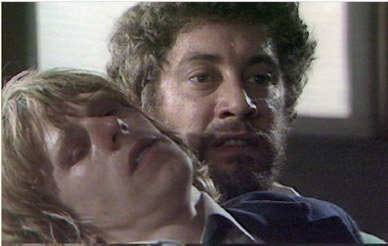
Campion’s Interview is a short (twenty-seven-minute) pendant, in which Campion (Julian Curry) applies for a job as head of the new comprehensive in town. As the interview progresses, it’s clear that Campion – and for that matter, writer Brian Clark – is using the occasion to provoke a debate on the real motivations between selective and comprehensive education.
While many Plays for Today were directed by people who saw themselves as filmmakers, shooting on film and often going on to big-screen careers (such as Loach, Frears, Leigh and to a lesser extent Alan Clarke), the theatrical side of drama was still around: shot on video in the studio (with some brief on-film exteriors at the beginning and end of Gotcha). There’s also a notably theatrical air to much of Keeffe’s dialogue in particular. You could easily see both plays performed on the stage, maybe as a pair of one-acters. Barry Davis directed both plays. He had been specifically requested by Keeffe, as Davis had been his English teacher and had encouraged him to write. This was a breakthrough role for Philip Davis and was the last but one for Clare Sutcliffe, adept as ever at playing much younger than her actual age (thirty-three).
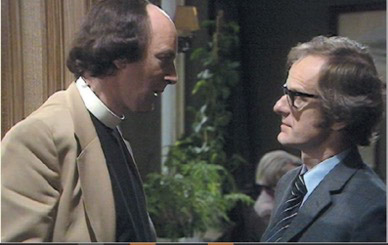
Gotcha was controversial on its first broadcast. It’s certainly a despairing work. While Lynne tries to reach out to the unnamed young man, despite his not-much-disguised sexual threat to her, it’s clear that there’s no quarter given by the men, no intention to bridge any gap, and the result is violence. It’s a play that rivets the attention and aims to give a voice to those not often heard – it’s not too much of a stretch to compare this play to the punk movement then at its height, and that also applies to the same year’s Scum, intended as a Play for Today but banned by the BBC. Clean-up-television campaigner Mary Whitehouse complained about the scene where the Kid (as he is billed) sexually assaults Lynne by forcing his hand up her skirt but was particularly exercised by the language, though it’s actually fairly moderate, then as well as now. (One “fucking” slips through, though I don’t know if that was actually scripted nor if it was let through uncensored on that broadcast.) A proposed repeat was cancelled.
Despite its humour, Campion’s Interview is a drier piece, and you can easily imagine people turning the television off once Gotcha had finished, and it’s rather overlooked now. It ends with the cast credits, followed by those for Gotcha, and then the crew credits for both.
The BFI’s release of Play for Today Volume 2 comprises three Blu-ray discs encoded for Region B. There are two plays per disc, in the order I’ve reviewed them above.
As these plays are products of television before the widescreen era, they are presented in their original aspect ratio of 1.33:1. Stocker’s Copper, The Spongers, The Elephants’ Graveyard and Just a Boys’ Game were all shot on 16mm film and have been restored at 2K resolution from the original negatives. Given that we are watching these plays on larger and more unforgiving devices than we might have done in the 1970s, the results are uniformly very good, with rather more grain than you might have noticed originally. As these plays were made for showing on a PAL television service, the Blu-ray transfers are 1080i50, reflecting the original speed of twenty-five frames per second.
Victims of Apartheid and the Gotcha/Campion’s Interview double bill were made in the studio in the then-common format of 625-line PAL video with 16mm used for the scenes outside (of which there are none in Campion’s Interview), telecined in during the studio recording. The difference between the two is very clear, but then it was at the time. Given the source, all that Blu-ray adds to plays is larger storage capacity and less compression, so this upscale to HD (720p) makes the plays look as good as they could ever do.
Other than a few experiments with radio simulcasts, television was entirely monophonic, and that’s what you get on all of these plays, all rendered as LPCM 1.0. Dialogue, music (where present) and sound effects are well balanced and more mature ears will note that clarity of diction is higher than can be the case today. Possibly too much so: I’ve mentioned the restrictions on language the BBC had for its drama at the time, so it is a surprise to hear the occasional F-word slip past, as it does, once each, in The Spongers, Just a Boys’ Game and Gotcha. It’s likely that these might have been muffled in the sound mix when heard through 1970s television speakers, or they may have been removed by the BBC censors before their original broadcasts, and whether they were scripted or came about during the shoot is a question I can’t answer. (Volume 1 included the shooting scripts as on-disc extras but that hasn’t been done here.)
All the plays have English hard-of-hearing subtitles available. These are mostly accurate, with a small handful of typos such as “cornakes” for “cornflakes” in Just a Boys’ Game. While the subtitler manages the Scots dialect of that play quite ably, he or she seems less aware of Welsh spelling, as we get “Pontyprith” for Pontypridd in Stocker’s Copper and “Rhyll” for Rhyl in The Spongers. It's worth noting, however, that we're working from a review disc and that this small errors may have been corrected on the release version.
There are no on-disc extras in this set. However, it does include a sixty-page book, which has a spoiler warning at the start, so read the contents once you’ve seen the plays.
The book begins with an introduction by Peter McDougall, “But That Was Then”, in part a tribute to Play for Today and in part a personal piece on how he became a writer. This is followed by essays on each of the plays: in order, Hugh Stoddart on Stocker’s Copper, David Archibald on both The Elephants’ Graveyard and Just a Boys’ Game, Lisa Kerrigan on Gotcha and Campion’s Interview, Rebecca Vick on The Spongers and Kaleem Aftab on Victims of Apartheid. As a screenwriter himself, Stoddart pays particular attention to the structure of the play in question. Archibald pays tribute to McDougall’s two plays as part of a tradition of Scottish drama, particularly Scottish working-class drama, not always found acceptable by the establishment. Kerrigan’s piece spends more time on Gotcha than its companion play, unpicking the controversy it aroused at the time. Vick pays tribute to a particularly celebrated play, drawing on the accounts of the producer, the late Tony Garnett. And finally Aftab’s piece is a view of a play about a man of colour but written by a white man, assessed here by a man of colour, addressing my slight misgivings above. Also in the book are notes on the transfers, acknowledgements and stills.
Play for Today was a key drama series of the 1970s and early 1980s. It made the name of many younger screenwriters and directors and was a home for key work of already established names. With over three hundred plays in a variety of genres and styles, it has a rich legacy. This is the BFI’s second selection from that legacy and there’s certainly scope for more.
|